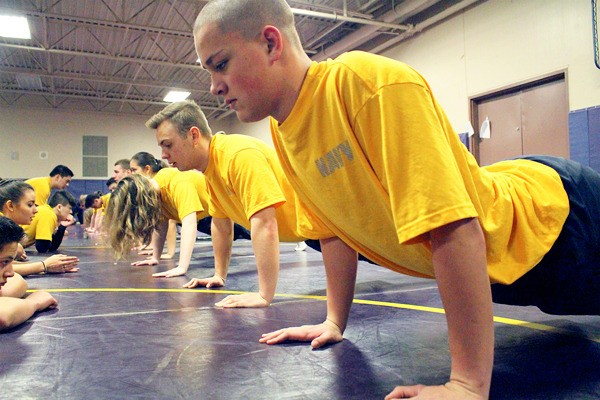It’s Friday morning at Oak Harbor High School, and the sound of Chief William Thiel’s class exercising is audible from the next building.
Students dressed in matching yellow T-shirts and blue shorts count in unison as they stretch.
Afterward, they belt out push ups and sit ups as Thiel hovers nearby with a stopwatch and clipboard.
The students are members of the school’s Naval Junior Reserve Officer Training Corps program. Physical training is a regular part of the curriculum.
Many of the students are a little baffled as to why state lawmakers put forward a bill that would prevent them from waiving gym if they take military science classes.
The bill, if passed, may inadvertently stifle participation in military science. That’s not sitting well with many people in Oak Harbor, home of Naval Air Station Whidbey Island and one of the best high school military science programs in the region.
“Please don’t do it,” said Nate Mecon, a 17-year-old NJROTC student. “We push it more in here than the PE classes.”

The proposed legislation, House Bill 2664, proposes to do away with school district’s authority to waive, substitute or exempt physical education except for disability or religious belief.
Now, school districts have the authority to allow students to take military science instead of gym class. Students involved in sports can also waive PE.
The text of the bill cites the importance of physical activity and the value of a comprehensive health and fitness program.
Why not just take both?
The problem is students have to take so many required classes for graduation, there isn’t much wiggle room for electives, explained Oak Harbor High School Principal Dwight Lundstrom.
If HB 2664 passes, students who want to take military science might have to sacrifice the ability to take honors courses or electives such as music and drama.
It would diminish participation in the school’s high-performing NJROTC program, he said.
Mecon — a high school junior who answers questions with a crisp “yes, ma’am” — ticked off the benefits of the program. He’s learned leadership skills and how to be a better citizen.
It’s giving him a big boost in his career.
Mecon said he hopes to serve in the Army and already enlisted for six-years with the National Guard.
Students who complete the program can get a leg up if they enlist in the military by entering at a higher rank. The Oak Harbor program’s “distinguished” status gives up to three qualified graduates coveted spots in military academies.
This bill won’t affect Mecon, but he worries about underclassmen, who will be forced to choose between military science classes and other electives. Waiving PE allowed him to take at least one elective he’s passionate about — metal fabrication.
Oak Harbor Public Schools Superintendent Lance Gibbon likened the bill to an unfunded mandate, since the burden would be on the school districts to find more space for gym class and more teachers.
Rep. Dave Hayes, R-Camano Island, said he understands the motivation behind getting sedentary kids moving but his fellow lawmakers “are aiming at the wrong demographic.”
“There’s probably a better way to address the matter than taking away motivation for military science classes,” he said.
He sits on the Committee on Education, which is scheduled to hear testimony on this bill in Olympia Feb. 4.
Hayes’ office has received dozens of emails from people in Oak Harbor unhappy with the bill, but the issue affects his constituents in other areas which also offer military science.
“I’m an advocate for local control,” he said.
“Here is another example of a bill coming through the state that would reduce it.”


